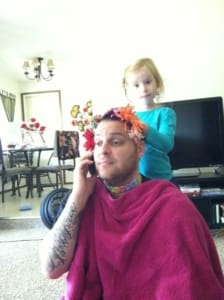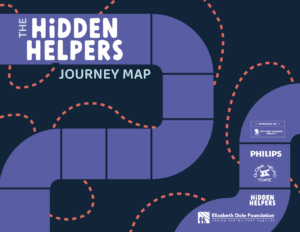Gracie has grown up in a world where her father’s health challenges have always been part of daily life. Since the age of four, she has helped care for her dad, Dave—a Marine Corps veteran who lives with PTSD, full-body paralysis episodes, and blindness in one eye as a result of his military service. Her story reflects the reality of thousands of hidden helpers across the country—children who serve as caregivers to wounded, ill, or injured service members or veterans—but whose experiences are rarely recognized or understood by the public.
As a hidden helper, Gracie has always known that her childhood was different. While other kids played without a care in the world, she had responsibilities at home to help her dad and family as needed. Even as a young child, Gracie pitched in by helping with housework, ensuring her dad’s comfort, and bringing moments of levity and joy, like coloring on his arms with markers to cheer him up during moments of paralysis.

Now older, Gracie takes on even more responsibility. When her dad experiences a paralysis episode—what her family calls being “stuck”—she and her mom work together to keep him safe, making sure his airway stays clear and helping move him to a more comfortable position. These episodes can last anywhere from fifteen minutes to over four hours. When her mom is at work, many caregiving and household duties, including cooking, often fall to Gracie.
Despite the challenges, Gracie embraces her role with maturity and compassion. She’s proud to support her dad, and she’s found a healthy balance between her caregiving responsibilities, school, and her social life. She takes joy in the fact that her father remains positive and fulfilled, largely due to the strength of their close-knit family. Still, Gracie acknowledges the urgent need for greater recognition and support for caregiving youth—many of whom don’t have the same level of resources or emotional support her family does.

The Elizabeth Dole Foundation is proud to host the annual Hidden Helpers Summit in the coming weeks—a platform for young caregivers like Gracie to share their stories, connect with one another, and help shape real solutions. During the event, we will also unveil the Hidden Helper Journey Map, an interactive experience designed to help families and communities better understand the everyday lives of these remarkable children—their responsibilities, challenges, and strengths.
Gracie’s story is one of quiet strength, love, and devotion. It reminds us that behind every wounded or ill service member or veteran is often a hidden helper whose contributions are just as courageous. By listening to their stories and taking meaningful action, we can ensure that children like Gracie are no longer hidden—they are honored, supported, and celebrated.



